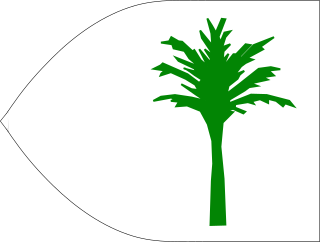
The Kanem–Bornu Empire existed in areas which are now part of Nigeria, Niger, Cameroon, Libya and Chad. It was known to the Arabian geographers as the Kanem Empire from the 8th century AD onward and lasted as the independent kingdom of Bornu until 1900.
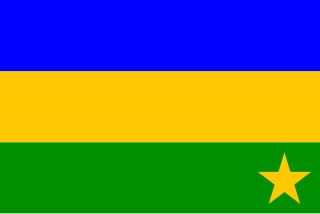
The Kanuri people are an African ethnic group living largely in the lands of the former Kanem and Bornu Empires in Niger, Nigeria, Chad, Libya and Cameroon. As well as a diaspora community residing in Sudan. Those generally termed Kanuri include several subgroups and dialect groups, some of whom identify as distinct from the Kanuri. Most trace their origins to ruling lineages of the medieval Kanem-Bornu Empire, and its client states or provinces. In contrast to the neighboring Toubou or Zaghawa pastoralists, Kanuri groups have traditionally been sedentary, engaging in farming, fishing the Chad Basin, trade, and salt processing.

Maiduguri is the capital and the largest city of Borno State in north-eastern Nigeria, on the continent of Africa. The city sits along the seasonal Ngadda River which disappears into the Firki swamps in the areas around Lake Chad. Maiduguri was founded in 1907 as a military outpost by the British Empire during the colonial period. As of 2022, Maiduguri is estimated to have a population of approximately two million.

Borno State is a state in the North-East geopolitical zone of Nigeria, bordered by Yobe to the west, Gombe to the southwest for 93 km, and Adamawa to the south while its eastern border forms part of the national border with Cameroon for about 426 km, its northern border forms part of the national border with Niger, for about 223 km mostly across the Komadougou-Yobe River, and its northeastern border forms all of the national border with Chad for 85 km, being the only Nigerian state to border three foreign countries. It takes its name from the historic emirate of Borno, with the emirate's old capital of Maiduguri serving as the capital city of Borno State. The state was formed in 1976 when the former North-Eastern State was broken up. It originally included the area that is now Yobe State, which became a distinct state in 1991.

Rabih az-Zubayr ibn Fadl Allah or Rabih Fadlallah, usually known as Rabah in French, was a Sudanese warlord and slave trader who established a powerful empire east of Lake Chad, in today's Chad.
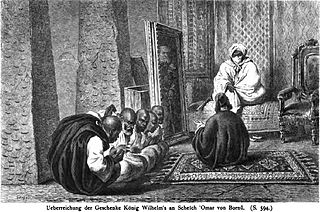
Umar I ibn Muhammad al-Amin or Umar of Borno was Shehu (Sheik) of the Kanem-Bornu Empire and son of Muhammad al-Amin al-Kanemi.

Shehu al-Hajj Muhammad al-Amîn ibn Muhammad al-Kânemî (1776–1837) was an Islamic scholar, teacher, religious and political leader who advised and eventually supplanted the Sayfawa dynasty of the Kanem-Bornu Empire. In 1846, Al-Kanemi's son Umar I ibn Muhammad al-Amin became the sole ruler of Borno, an event which marked the end of the Sayfawa dynasty's eight hundred year rule. The current Shehu of Bornu, a traditional ruler whose seat remains in modern Borno State, Nigeria, is descended from Al-Kanemi.

Abu Bakr bin Ibrahim al-Kanemi CBE, was the Shehu of Bornu from 1902 to 1922.
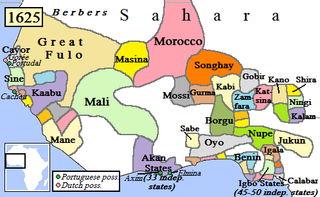
Nigerian traditional rulers often derive their titles from the rulers of independent states or communities that existed before the formation of modern Nigeria. Although they do not have formal political power, in many cases they continue to command respect from their people and have considerable influence in their community.
The Dikwa Emirate is one of the successor states to the old Bornu Empire, a traditional state within Borno State, Nigeria. It was established in 1901 at the start of the colonial period after the Bornu empire had been partitioned between the British, French and Germans.
The Biu Emirate is a traditional state based in Biu in Borno State, Nigeria. Prior to 1920 it was referred to as the Biu Kingdom.
'Abd ar-Rahman, Abdurrahman or Darman was Shehu of Borno from 1853 to 1854.
Bukar or Bukar Kura bin Umar al-Kanemi was Shehu of Borno from 1881 to c. 1884.
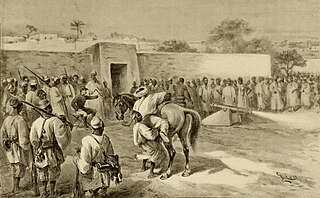
Ashimi or Hashim bin Umar al-Kanemi (1840s-1893) was Shehu of Borno from ca.1885 to 1893.
Kyari or Khair bin Bukhar al-Kanemi (?-1894) was Shehu of Borno in 1893–1894.

Shehu Umar Sanda ibn Ibrahim Kura al-Kanemi was the Shehu of Borno from 1922 to 1937. He was the son of Shehu Ibrahim Kura of Borno and brother of Shehu Abubakar Garbai.
Shehu Umar Ibn Muhammad also known as Shehu Sanda Kyarimi, CBE, CMG, KBE, was Shehu of Dikwa between 1922 and 1937 and Shehu of Borno from 1937 to 1967.

Shehu Mustafa Ibn Umar El-Kanemi was the Shehu of Borno from 1974 to 2009.

Abubakar Ibn Umar Garba Al Amin El-Kanemi Shehu Of Borno is the Shehu, or traditional ruler, of the Borno Emirate in northeast Nigeria.
Sanda Wuduroma, or Abu Sanda bin Buqar al-Kanemi, (?-1894) was Shehu of Borno in 1894.














